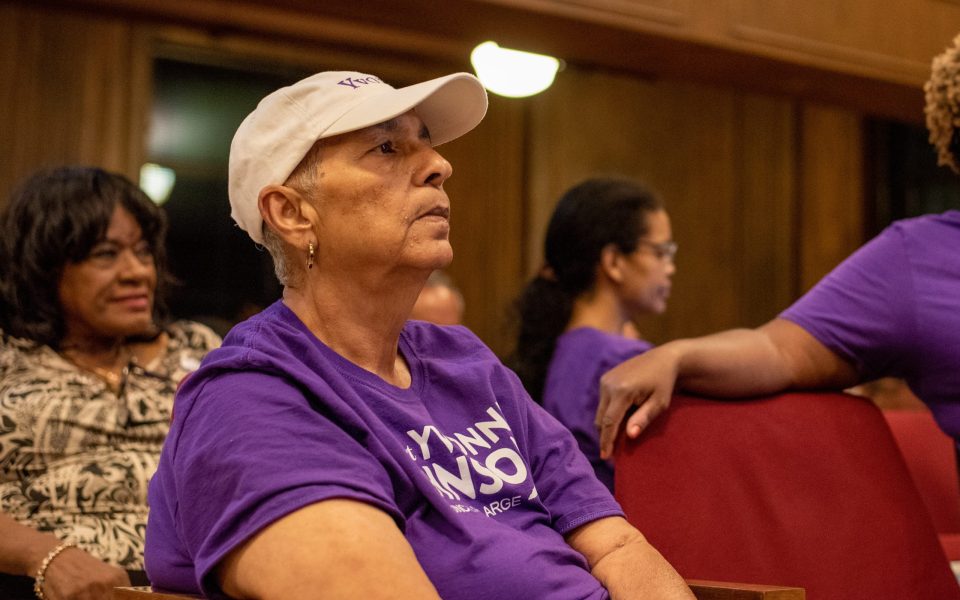PHOTO: Yvonne J Johnson waits for the election results in the Guilford County Courthouse in Greensboro N.C., on July 26, 2022.

The news of Yvonne Johnson’s passing yesterday hit me pretty hard. Though she predated my own time in the Greensboro news business — beginning her tenure on Greensboro City Council in 1993, seven years before I moved here — she had loomed large as a figure for the entire time I have been covering news in the city.
I was with her the night she became the first Black mayor of Greensboro in 2007, first at the Guilford County Courthouse as the results came in and then covering her victory part which, if memory serves, was held in an upstairs room at Triad Stage later that night. I remember her sitting at a long table full of people, smiling in that calm, benevolent way she had as the party raged on around her.
And I was there when she lost her re-election bid to Bill Knight in 2009. This was when Greensboro City Council members served 2-year terms, and just as the partisan divide under which we now live was burgeoning. Barack Obama had recently been elected as the first Black president, causing a ripple effect that we are also still feeling today.
I caught a moment of her time that afternoon while folks were still voting, and I remember mentioning to her that I thought she had a pretty good chance of winning. At that she grew hard and serious.
“You think you know something?” she asked me. “I don’t think you do.”
She knew, before the rest of us. And maybe I did, too.
That was the day I encountered Greensboro political fiver Bill Berkeley at the Bluford Elementary polling place, where he was quietly watching the proceedings. He was working for the Knight campaign at the time, so I cornered him and grilled him for an hour about why he was there, what he was looking for.
He told me that Bluford was a bellwether precinct for indicating the Black vote in an election, and that according to his numbers in relation to years past, Black turnout would be low that year, which would probably affect the mayoral election.
“I actually think we have a shot at this,” he told me. To my discredit, I did not believe him until the final numbers came in.
The next two years were the only ones in my time in Greensboro that did not see Yvonne Johnson on city council — she was elected at-large again in 2011, and once again got the most votes on the slate, making her mayor pro tem. Again.
Over the next decade or so we would have informal conversations over cigarettes outside Melvin Municipal, or brief moments at one official gathering or another — she went to all of them. Sometimes she would give feedback on our reporting; sometimes she would tell me stuff going on in the city; sometimes we would talk about our families. She was always cordial, always pleasant, always informative and so plugged into what was happening in Greensboro — in ways other councilmembers weren’t — that I always benefited from any time we spent together.
Yvonne was a steadying presence on council, with deep institutional memory and long relationships that reached into every corner of the city. She was an Aggie and a Bennett Belle, retaining her affinity for wearing purple the whole time I knew her. In meetings, she didn’t grandstand or pontificate, but always brought intel from corners of the city that would have been overlooked had she not visited those places herself and listened to the people who lived there.
Yvonne listened. She processed what she learned. And she took action.
Yvonne Johnson will be remembered as Greensboro’s first Black mayor, yes, something of which she was very proud. But I think she would be more proud of her life in service and the good she was able to do. Her nonprofit, One Step Further, helped hundreds of Greensboro youth avoid jail, hundreds of the convicted rebuild their lives upon release, hundreds of conflicts find resolutions beyond the two-dimensional dictates of law enforcement. Her legacy extends well beyond her entry in the history books.
She will be mourned. She will be missed. Sooner or later there’s likely a statue or a street or a building in the city that will bear her likeness and name.
But my hope is that someone continues her work: reaching out to the most neglected corners of the city, listening to the problems of the people there, doing what she could to help. But she would have wanted some of us to try.
Join the First Amendment Society, a membership that goes directly to funding TCB‘s newsroom.
We believe that reporting can save the world.
The TCB First Amendment Society recognizes the vital role of a free, unfettered press with a bundling of local experiences designed to build community, and unique engagements with our newsroom that will help you understand, and shape, local journalism’s critical role in uplifting the people in our cities.
All revenue goes directly into the newsroom as reporters’ salaries and freelance commissions.


Leave a Reply